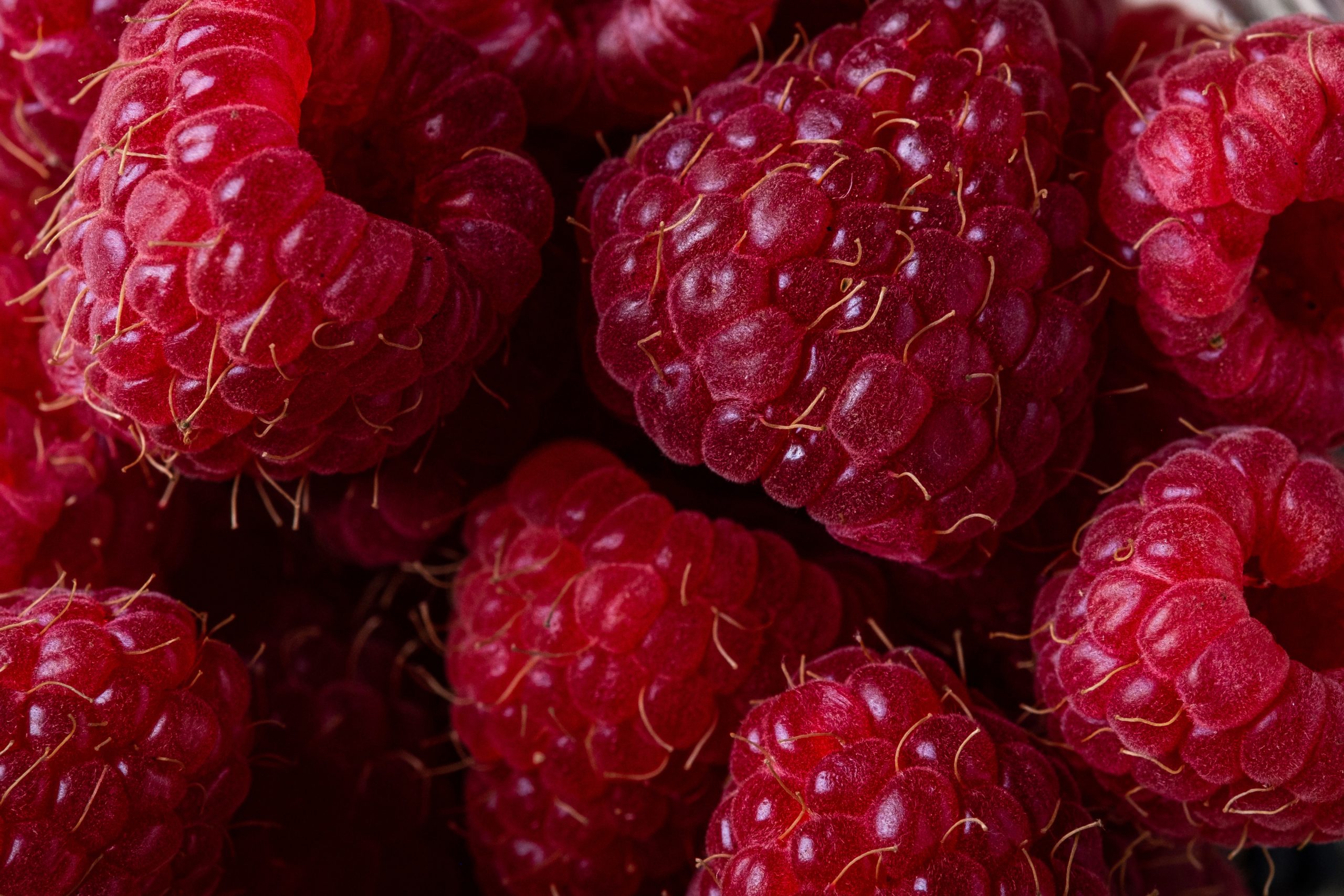
If you are wondering if your dog can eat raspberries, then you are in the right place.
So can dogs eat raspberries? Yes, you can feed your dog raspberries. However they should be given to them in moderation. Raspberries are packed full of super antioxidants, providing long lasting health benefits to dogs.
Let's explore the effects of raspberries and your dog further:
Most excitable dogs will have a sniff and nibble at anything new in sight. The wonder of new smells tickle their fancy and it may well be that you have a few exotic treats around the house, such as those delicious colorful fruits that you pick up in summer, or some boxes of muesli that your dog somehow miraculously manages to chomp through. “How on earth did he get into that!” You ask yourself. It’s not always easy to hide every item of food and material out of sight, but it is good to get a knowledge of what things will be good for them and what foods may be less of a treat.
It’s the middle of summer, the temperatures are soaring and you want nothing more than to grab a bowl of delicious raspberries and sit out on your terrace. You’re soon joined by your furry friend and he too wants in on the action; after all raspberries do smell like a sweet delight! So are they actually safe for dogs to eat and what exactly could be the implications if he manages to get just one little bite of your raspberries, Can dogs eat raspberries or are they toxic to dogs?
Are Raspberries Safe For Dogs?

Edit your caption text here
Well, in theory, there is a rule that says that they are in fact perfectly safe for dogs, but are they good for dogs? This does however not mean that you should be popping them into their morning bowl of breakfast as an exciting breakfast topper. It does however mean, that in moderation, as with many human treats, chocolate included, raspberries can be perfectly safe. They are not likely to be needing that emergency trip to the vets if one touches their lips. Raspberries are jam packed to the brim full of super antioxidants, that can provide long lasting health benefits to them. Some of the further benefits of the fruit are: they are full of potassium, vitamin C and E, selenium, beta carotene, lutein, lycopene, folic acid, magnesium, and zeaxanthin. Sounds far too good to be true doesn’t it? These create rich and beneficial chemical reactions in the body that aid short-term and long-term health. Dogs of all ages can benefit from the goodness of this rich berry and its potent nutritional benefits, but they can be particularly beneficial to senior dogs who may suffer with inflamed or sore joints.
We know some dogs ail a little in their old age, as much as we do, therefore an added boost of anti-inflammatories in their raspberries can alleviate some of their symptoms. It won’t have them bounding around like puppies again, but it could contribute to better mobility which could be visible when walking them.
Raspberries, truly, can be a ‘treat’ for dogs more than a regular addition to their diet, too many raspberries can affect certain aspects of a dogs system, including their digestion, so it’s best to avoid them in excess if you wish to avoid running around trying to diaper your beloved dog!
Fiber found within raspberries can be a good weight loss aid. There’s no need to send your dog to the local fitness center if you add a couple of raspberries in to their diet. Fiber essentially means they will feel fuller for longer, meaning they will eat less! Hurray, there is no need to buy that extra bag of dog food after all, that can be saved for my weekend binge eating session. Well, not quite. Dogs still need sustainable and healthy food daily but it can aid in their diet. It can also help relieve them of hunger pains in between meals, so they are less likely to eat more and therefore keep their weight down. Genius!
So how much is too much for pooch?
Well, the amount you feed your dog, naturally depends on the size and appetite of your dog. On a daily basis, larger dogs, such as labradors, retrievers, great danes, will probably happily snack on around six to ten raspberries. It doesn’t sound like a lot in comparison to human consumption but this is a standard healthy amount for dogs of this size. Medium sized dogs and smaller sized dogs should have anywhere between three to six berries.
Try to ensure that the berries are not fed to them as part of their main meal. Separate them as a light snack or treat, to feed their curiosity when the time comes to start nibbling on the in-season fruit. After all, raspberries are also packed full of sugar, so for your dog they will certainly seem like a sweet treat, if not sometimes a tangy treat!
How Can You Get Dogs To Eat Raspberries?
Get creative! In all seriousness, however, the choice is up to you, whether you wish to place them in their regular feeding bowl, or allow them to eat a few of the leftovers from the carton, as long as they are away from hazards.
Adding raspberries to their water bowl could confuse them, even if you think that it will flavor the water, it is likely not wise; however you can add them to any of their sweet treats, such as soft scoop or yogurt, whatever your pooch has a preference for! Thankfully raspberries can be eaten whole and they don’t need to be cut, but washing them can be a good idea just to eliminate any pesky pesticides that shops use. Nobody wants to ingest those!
My dog accidentally ate too many raspberries and they have diarrhea, what should I do?

If your dog does accidentally eat too many berries from your unattended bowl of raspberries, then you will want to monitor them for any changes in their eating and toilet habits, as well as any visible discomfort. Too many raspberries will have a laxative effect on their bowels, therefore, if diarrhea does occur, you must keep them very well hydrated to replenish the lost fluids.
Another thing to look out for, which could cause irritation to a dogs stomach, is for the raspberries that may have pits in them. Cherries are often the fruit that poses the biggest threat because of its large pit but if they do consume anything untoward them it could create choking, a hazardous and potentially life-threatening issue, as well as issues with their intestines as the pits pass through. Usually they will pass in their stools without any problems, but if it seems they are in discomfort, it’s best to take them to the vet to ensure nothing is obstructing their small intestinal passages.
Dispose of any berry pits immediately and ensure that you buy raspberries that are free from them; this way you will not have to worry about your dog accidentally ingesting them. Death by raspberries is no joke! These can also result in a choking hazard for smaller dogs, so double check that they are removed before feading.
Let’s wrap it all up and recap!
Raspberries can be a very healthy and sweet treat for your dog. This however is only in moderation and is best to be given in small quantities just as a fun treat. They can be great for arthritic joints and even help with helping them maintain a healthy natural weight.
If they do happen to ingest too many raspberries, they may feel a little uncomfortable and it could cause either mild or severe diarrhea. If this happens, try your best to comfort them with fluids and ginger and keep an eye on them to see if their condition worsens.
If their condition does worsen in any way, be sure to have them looked over immediately by a vet. With all that being said and you no longer wondering "can dogs eat raspberries" and "are they safe?", who’s ready for summer?!
What berries are bad for dogs?
Here's a list of some other foods (many fruits) which you might be asking, can dogs eat? Remember to seek professional advise from your vet if your dog experiences any side effects after they are fed any new foods.



















